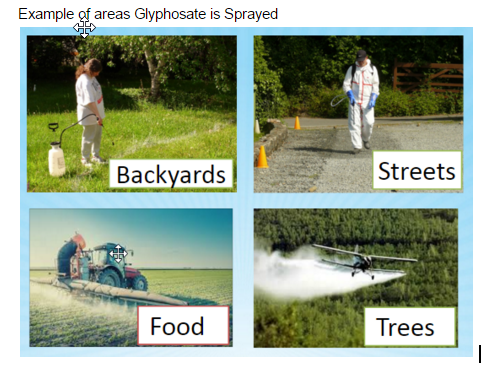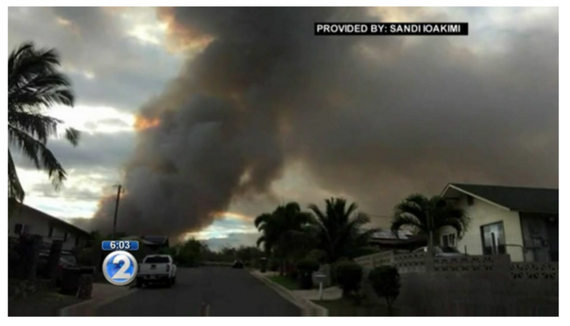Last week, I received an alarming email from the EPA Pesticide Review Board regarding Glyphosate.
The EPA informed me that the assessment of Glyphosate "will be delayed until 2016." In the unlikely scenario that they complete the assessment promptly, their decision will be put off for at least another year because, "Typically, we issue the Proposed Interim Decision 3 fiscal quarters from the date of publication of the risk assessments."
The situation is far from typical. Glyphosate is the world's most common herbicide and was just deemed a probable carcinogen by the World Health Organization. It is found in RoundUp as well as 700 other widely used herbicides sprayed on non-organic and GMO food. It does not wash, dry or cook off and new studies show many aspects of harm. The EPA will be completing an assessment of Glyphosate to decide whether or not to re-approve the license of this chemical to be used in chemical farming, private and public spaces for another 15 years.
The EPA offered only this explanation for the delay:
"We cannot get into the details of that, but much of it has to do with our desire to ensure that everything looks as it should, considering the intense public scrutiny we anticipate for glyphosate. "
This delay seems to be another maddening display of red tape and bureaucracy; unfortunately the reality is far more serious. The EPA's inability to come to a decision means a cancer-causing agent will continue to be sprayed on our food and public areas.This is not a typical situation. Millions of people will be impacted by the EPA's procrastination; for some, the effects could be irreversible.

Glyphosate has been found to increase the growth of breast cancer cells, is linked to non-Hodgkin's Lymphoma, and is acknowledged as a reproductive effector. It is also known to cause liver and kidney damage, chelate vital nutrients and minerals and kill essential beneficial bacteria and human placental cells.
Adding to the concern, glyphosate is sprayed on wheat, beans, grains and as shown here, sugar cane fields as a drying agent. These fields are burned several times a year near thousands of residents and schools in places like Hawaii, sending children to the hospital on a regular basis.

The EPA's own policy is to reassess all existing tolerances within 10 years
and give special consideration to risks to infants and children.
Despite their own safety standard, The EPA's last approval of glyphosate began in 1991 and completed in 1993, over 22 years ago.
The EPA began their reassessment of glyphosate in 2009, 6 years ago, and now they are admitting they will take at least 7 years to come to a decision. The choice to not make a decision is actually a choice to continue to allow actions of harm in the public domain.
Don M. Huber, Professor Emeritus of Plant Pathology of Purdue University commented on this delay.
"The health of our soils, crops, animals, and people continues to deteriorate each day this product is in the environment. Procrastination only exacerbates the problem!"
Numerous organizations have found glyphosate in soil, water, rain, air, breast milk, food, and Pediasure feeding tube given to children who are battling cancer. In each case, it's been detected at levels far above the amount shown to destroy gut bacteria where the stronghold of the immune system lies.
In 2014, my organization found glyphosate in breast milk at alarmingly high levels. We met with the EPA and a member of the WHO in May, following our discovery. Over the course of our two-hour meeting, our findings were brushed aside and accused of being invalid. Our response was to ask them to test.
They did, or are. The EPA said their breast milk-glyphosate testing results would be announced with their assessment. Perhaps the testing we insisted on over a year ago is a factor in the delay.
Regardless of any reasons for the delay, the bottom line remains the same. We are expected to wait another year while the spraying of glyphosate on our food and in public spaces continues.
At the very least, with all the new scientific studies, we should be able to expect the EPA to halt the spraying of glyphosate on food crops and public areas until further assessments are completed. Numerous health organizations have advised the EPA to warn any women who are pregnant, attempting to become pregnant or breastfeeding to avoid pesticides and herbicides. A 2013 report showed that more babies die on their first day of life in the US than in 68 other countries. According to doctors, these losses were primarily due to the babies being underweight and having birth defects. These same factors were cited by pig farmer Ib Pedersen and scientist Monika Kruger, who repeatedly tested 3000 pigs fed grains sprayed with glyphosate.
This is an urgent matter of life or death. When a taxpayer-funded agency such as the EPA is dragging their feet for seven years in doing their job, they are no longer protecting the people they are responsible for. After years of reckless stalling, the only logical conclusion is that they are protecting the chemical companies who stand to lose millions from the banning of glyphosate.
We are expected to stand idly by and watch as our elected officials deny us safe food and the right to know what is in our food. However, we can and will vote these so-called leaders, who refuse to protect us, out of office. But we will not just wait for an election to take action.
We mothers will take action daily to protect our children and expect our leadership to do the same. It is time for employees of the EPA and our Senators to do what is right. It is time for every mother, father, caretaker and consumer to buy only organic food as much as possible. It is time for food manufacturers to demand organic ingredients. It is time for gardeners and farmers to stop spraying glyphosate and toxic chemicals now. We cannot and will not wait for others to protect us. Life in our wombs, in our families and on our planet is too important.
Zen Honeycutt
